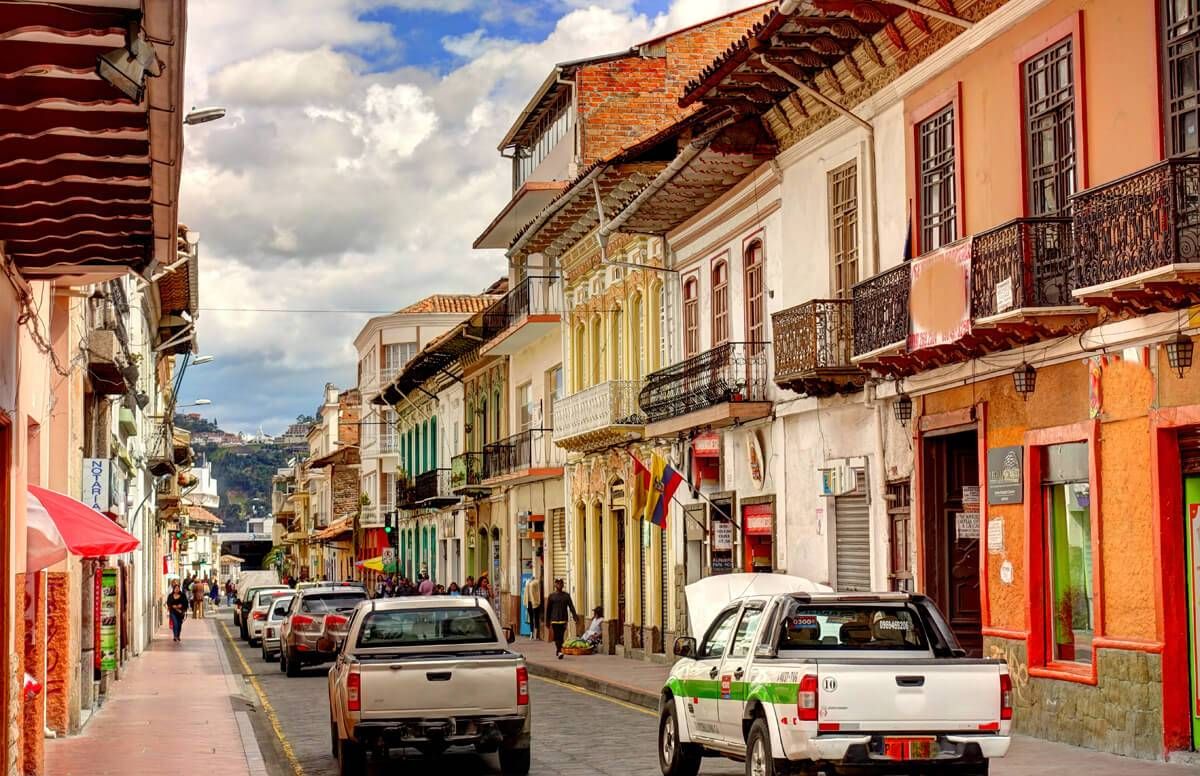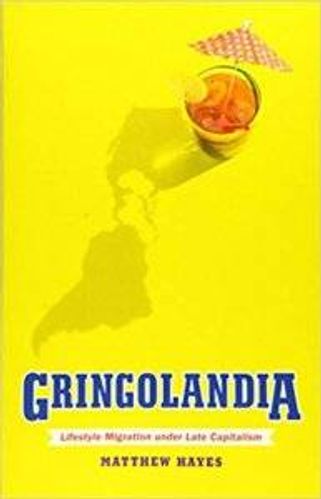Retired Expats in Ecuador: What Life's Really Like for Them
The 'Gringolandia' author talks about the 108 expats he met there
Ecuador regularly shows up on those “Best Places to Retire Abroad” lists. International Living named Ecuador its No. 4 country for the past two years and Live and Invest Overseas ranked Cuenca, Ecuador No. 7 on its 2019 list. And when I recently met with expats Edd and Cynthia Staton, who moved to Cuenca from Las Vegas 10 years ago and offer a Retirement Reimagined! Program to help others retire abroad, they couldn’t have been more effusive about their newish home.

But what’s it really like to retire in the South American country of Ecuador and why are so many Americans doing it?
Retiring in Cuenca, Ecuador: Perception vs. Reality
According to Matthew Hayes, author of the new book, Gringolandia, the reality is sometimes different from the rosy picture luring growing numbers of American expats.
Hayes is a somewhat unexpected authority on the subject of expats in Ecuador. Based in New Brunswick, Canada, the economic sociologist is the Canada Research Chair in Global and International Studies at St. Thomas University in Fredericton there. But he became fascinated by the trend and spent 39 weeks making field visits to Cuenca (pronounced QUEN-ka; metropolitan area population: 700,000) from 2011 to 2016, interviewing 108 people who’d moved there, mostly to retire; nearly all were Americans, a few were Canadians.
After reading Gringolandia, I interviewed Hayes about why Americans are retiring to Cuenca and what they’re finding once they arrive. Highlights below:
Next Avenue: What led you to write Gringolandia?

Matthew Hayes: I was thinking in 2010 about doing research into how peoples’ lives were being reorganized after the Great Recession. I knew some people in Cuenca and ran into a couple in Oregon who said they were moving to Ecuador. I was curious why.
It seemed like a nice place to me, but not especially warm, and no tradition of retirement communities. They said they had lost their savings and I thought, ‘This is a really interesting story.’ My parents were also approaching retirement at that time and worrying about what was happening to their savings. I thought this was a story worth telling.
Others told me that they began looking online for more affordable places to retire. And when they typed in ‘cheap places to retire’ or they started exploring this on the internet, they began running into stuff by international lifestyle marketers, especially International Living. This company and others produced a lot of content and linked it to content generated by individuals with blogs. Cuenca had been heavily marketed since 2009.
Why did the expats say they moved to Cuenca, Ecuador?
I focused my interviews on what was going on with people in their lives that might have led them to search for a lower-cost retirement destination. In that respect, what showed up was what they were moving from.
They wanted to get off the rat wheel. Maybe their careers didn’t develop the way they wanted to live. Or they wanted a more meaningful life. Some told me it might be difficult to purchase and sustain retirement in a place like Los Angeles if you’re not independently wealthy.
Some were looking for an adventure; travel is now a marker of success in the third age of life. It shows you are living a successful retirement.
They talked about being more active and able to socialize more and staying young by meeting people and getting involved in activities and seeing things they hadn’t seen before. It’s all very tied to the idea of active aging, which is a dominant cultural ideal of aging at this moment in time.
And the international lifestyle marketers are promoting real estate abroad and lifestyle experiences, making money off of those relocations.
You write in the book that quite a few of the women you met came as an adventure. Can you talk about that?
A lot did talk about moving as an adventure, but a lot of the women were moving for economic reasons and to be more active and to break with traditional gender roles that would have been assigned to them in the United States. For some, this was an opportunity to experiment with aging alone.

Would you describe the expats you met as wealthy?
A lot of the retirees were on fixed incomes and they wanted to live comfortably. All of them could be broadly described as middle class.
You say many of the expats call themselves ‘economic refugees.’ What does that mean?
It means they couldn’t stay in the United States living the life they were living without continuing to work. And some felt they were displaced. In a lot of cities, like Portland, Oregon, and San Francisco and New York and Chicago, the cost of living has increased so much in the last decade or two that some people feel it’s impossible to remain in place.
Many people I met also felt their job in the United States was just a job and they wanted something more meaningful in retirement.
What was their financial situation like in America before they moved to Ecuador?
One woman and her husband owned a restaurant that wasn’t going gangbusters and they had medical bills coming in. They were worried about having to declare bankruptcy. The story she told me was one of desperation, looking to get out of a bad situation.
If you go online and start researching places, marketers are pushing the vision that if you don’t have enough savings to afford retirement in America, there are places you can go and companies in those places will attempt to organize a comfortable lifestyle for you.
Like International Living?
Some people I interviewed said International Living provided far too rosy a picture.
I didn’t talk to anyone who felt they were tricked into moving to Ecuador. But I talked to people who said they had read articles and reviews on that website and moved there and then realized it wasn’t possible to live on $700 a month.
It is possible to live in Cuenca, Ecuador on a very low income, but it means radically changing your lifestyle. Many said you need to more money to live comfortably there because many of the apartments cater to North Americans and reflect North Americans’ tastes and are expensive.
And what’s the financial situation like for the expats now?
Most seem to be doing quite well economically. They talk about being able to go out more and often enjoy restaurants.
Are many of these people working part-time now? What kind of jobs?
A lo of people there are fully retired. There are some who have companies. They work online part-time. They say it’s easier to start a business in Ecuador than in the United States. Many are catering to other North Americans.
What are the biggest differences between what the expats thought they would find and what they did find moving to Ecuador?
The thing that surprised them, I think, is how living in a city in the United States had changed their lives. What came up in many interviews was how they lost weight when they moved to Ecuador because they’re so much more physically active, walking to places and eating healthier food.
What is the consequence of the migration of the expats for the native people in Ecuador?
One of the big issues is the different economic level of people moving across the globe. I’m not trying to say people shouldn’t travel. I’m just saying because the world is very unequal, these types of transactional migrations will have consequences on the lower-income communities.
Cuenca, Ecuador is a very unequal space. With thousands of people moving in with higher incomes, the economic impact is not necessarily shared equally. The people able to benefit have been the upper classes of Cuenca, who have more in common with Americans and understand their tastes. They’re able to open businesses to cater to their needs or own properties that can be rented or sold.
Why isn’t this migration benefiting all the people of Cuenca?
Many do benefit. There’s an increase in employment for domestic service people like gardeners. And there is a strong civic feeling among North Americans there who want to be involved in the community and do a lot of charitable work. And that’s no doubt deeply appreciated by people who benefit.
But many people there are employed at service-level jobs that are not sustainable jobs that enable them to gain long-term stable incomes. They’re often at the margins of the economy in Cuenca.
How well do the native residents get along and live with the expats?
I wouldn’t say there’s any great tension. They don’t see the Americans as migrants. They’re kind of like long-term privileged tourists to the people there. They’re remaking the city in ways that are positive for some, and displacing many.


